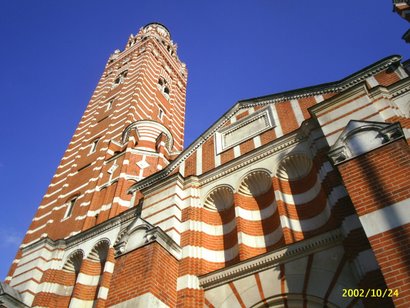 The mosaic image of the visit of the Wise Men (with camels just visible on the left), taken from the Lady Chapel, heralds the Feast of the Epiphany. This lovely feast is only partly about the Wise Men. Much more it is to do with the way the world comes to recognise its Saviour, and to understand the full significance of the babe lying in the manger. A medieval Christmas carol says that the stable contains ‘heaven and earth in little space’ – in other words, there is far more going on here than meets the eye.
The mosaic image of the visit of the Wise Men (with camels just visible on the left), taken from the Lady Chapel, heralds the Feast of the Epiphany. This lovely feast is only partly about the Wise Men. Much more it is to do with the way the world comes to recognise its Saviour, and to understand the full significance of the babe lying in the manger. A medieval Christmas carol says that the stable contains ‘heaven and earth in little space’ – in other words, there is far more going on here than meets the eye.
And so it was a journey for the Magi in more ways than one. They travelled indeed from distant lands, but they also travelled personally in faith. T S Eliot's oft-quoted poem entitled ‘Journey of the Magi’ describes a journey that is much more than a long camel-ride. It is a searing journey into self examination:
…..were we lead all that way for
Birth or Death? There was a Birth, certainly,
We had evidence and no doubt. I have seen birth and death,
But had thought they were different; this Birth was
Hard and bitter agony for us, like Death, our death.
We returned to our places, these Kingdoms,
But no longer at ease here, in the old dispensation,
With an alien people clutching their gods.
I should be glad of another death.
Visiting the stable in Bethlehem changes the Wise Men for ever, and so it should change us, causing us, like them, to re-evaluate our lives. We simply cannot think about God as we used to. The child lying in the manger places all our notions of life and death, of humanity and God, in the hazard, so that we can never view these things in the same way again.
 ‘Epiphany’ is a Greek word meaning ‘showing forth’ or ‘revealing’. What is revealed to the Magi, and in them to the world, is a new vision of God, not distant and impassive, but close and suffering. This God does not keep himself to himself, or even to a select few, but manifests himself to the wide world, even to its farthest flung peoples - as symbolised by the Magi. The gifts the Magi bring symbolically touch upon this mystery; gold, frankincense and myrrh each say something about the significance of the babe in the manger. He is at once royal, divine, and destined to die as a human. Kneeling with the Wise Men before such a mystery revealed, we must rethink our deity and re-examine our lives. If God loves us this much, then how can we turn our back on him? How can we ever fear him, or feel unworthy of him?
‘Epiphany’ is a Greek word meaning ‘showing forth’ or ‘revealing’. What is revealed to the Magi, and in them to the world, is a new vision of God, not distant and impassive, but close and suffering. This God does not keep himself to himself, or even to a select few, but manifests himself to the wide world, even to its farthest flung peoples - as symbolised by the Magi. The gifts the Magi bring symbolically touch upon this mystery; gold, frankincense and myrrh each say something about the significance of the babe in the manger. He is at once royal, divine, and destined to die as a human. Kneeling with the Wise Men before such a mystery revealed, we must rethink our deity and re-examine our lives. If God loves us this much, then how can we turn our back on him? How can we ever fear him, or feel unworthy of him?



No comments:
Post a Comment